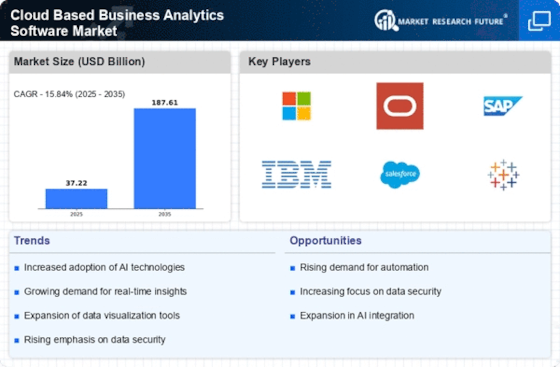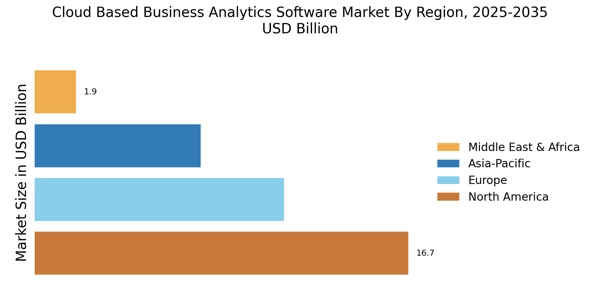Growing Emphasis on Cost Efficiency
Cost efficiency remains a pivotal driver in the Cloud Based Business Analytics Software Market. Organizations are increasingly seeking solutions that reduce operational costs while enhancing analytical capabilities. Cloud-based software offers scalability and flexibility, allowing businesses to pay only for the resources they use. This model is particularly appealing to small and medium-sized enterprises that may lack the budget for traditional on-premises solutions. As a result, the market is witnessing a shift towards subscription-based models, which are projected to account for over 60% of the total market share by 2025. This trend underscores the importance of cost-effective solutions in driving the Cloud Based Business Analytics Software Market.
Integration of Advanced Technologies
The integration of advanced technologies such as artificial intelligence and machine learning is significantly influencing the Cloud Based Business Analytics Software Market. These technologies enable organizations to automate data analysis, uncover hidden patterns, and generate predictive insights. As businesses increasingly adopt these technologies, the demand for cloud-based solutions is expected to rise. Reports suggest that the AI in analytics market alone could reach USD 40 billion by 2025, indicating a robust growth trajectory. This integration not only enhances the capabilities of analytics software but also positions the Cloud Based Business Analytics Software Market as a critical component of modern business strategies.
Increased Focus on Customer Experience
Enhancing customer experience is a primary objective for many organizations, thereby propelling the Cloud Based Business Analytics Software Market. Businesses are utilizing analytics to understand customer preferences, personalize offerings, and improve service delivery. The ability to analyze customer data in real-time allows companies to respond swiftly to changing demands. Market Research Future indicates that companies that prioritize customer experience are likely to achieve revenue growth of 4-8% above their competitors. This focus on customer-centric strategies is driving the adoption of cloud-based analytics solutions, further solidifying the Cloud Based Business Analytics Software Market's relevance in contemporary business practices.
Regulatory Compliance and Data Governance
Regulatory compliance and data governance are increasingly becoming critical considerations for organizations, influencing the Cloud Based Business Analytics Software Market. As data privacy regulations tighten globally, businesses are compelled to adopt analytics solutions that ensure compliance with legal standards. Cloud-based analytics software often includes built-in compliance features, making it easier for organizations to manage data responsibly. The market for compliance analytics is expected to grow significantly, with estimates suggesting a potential increase of 15% annually through 2026. This trend highlights the necessity for robust analytics solutions that not only provide insights but also adhere to regulatory requirements, thereby driving the Cloud Based Business Analytics Software Market.
Rising Demand for Data-Driven Decision Making
The Cloud Based Business Analytics Software Market is experiencing a notable surge in demand as organizations increasingly recognize the value of data-driven decision making. Companies are leveraging analytics to gain insights into customer behavior, operational efficiency, and market trends. According to recent estimates, the market for business analytics software is projected to reach USD 100 billion by 2026, reflecting a compound annual growth rate of approximately 10%. This trend indicates that businesses are prioritizing data analytics to enhance their competitive edge, thereby driving the growth of the Cloud Based Business Analytics Software Market.

















